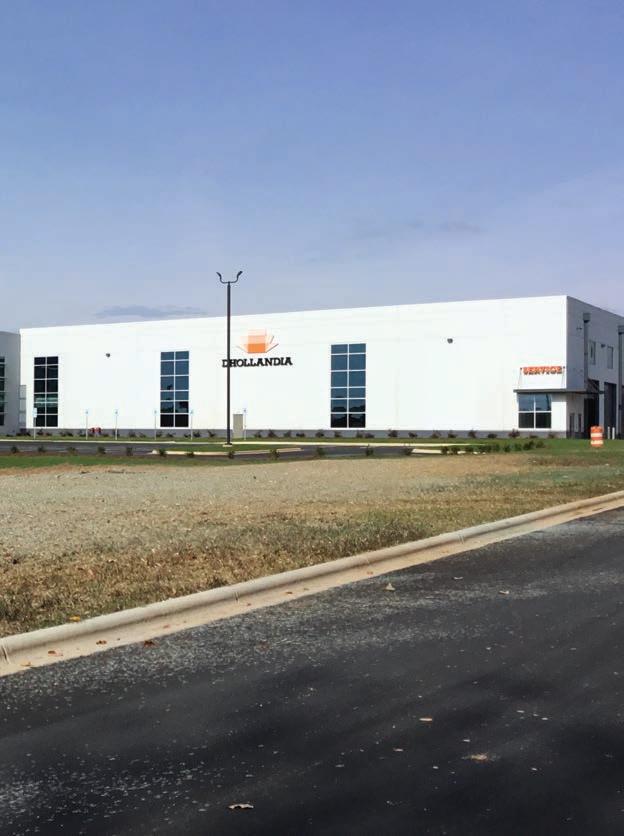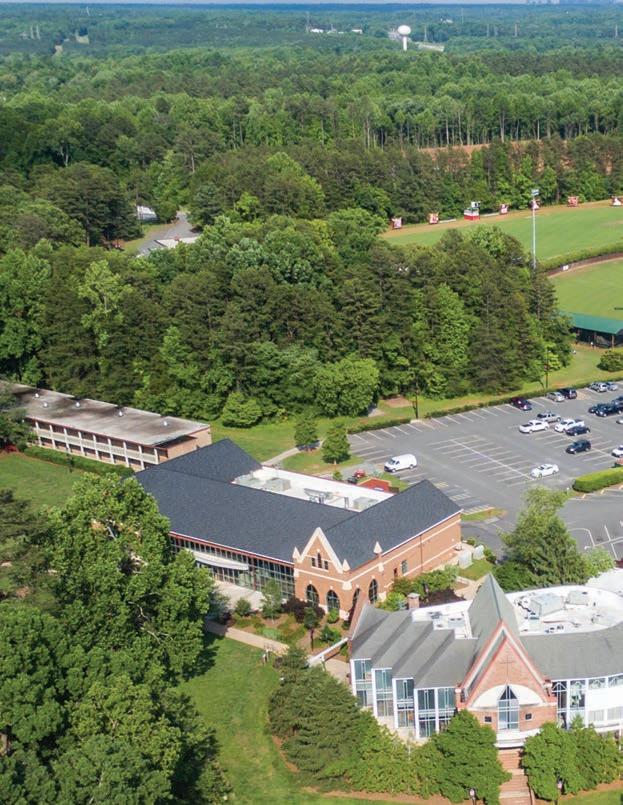
26 minute read
Gaston County
Firmly on the radar of domestic and international businesses, Gaston County has a reputation as a friendly place to do business. But it takes more than a good attitude to attract employers and new residents. A solid education system and the necessary outlets to provide a worklife balance are also key components to the county’s success.

Advertisement



Strong position:
Gaston County is emerging from the pandemic with growth in mind
Despite living through a pandemic year, Gaston County has emerged remarkably well positioned, which is partly related to the strength of its main industries, among them smart manufacturing and healthcare. A burgeoning arts and culture scene, in particular with the new FUSE District, and a highly ranked education system are among the county’s strengths.
Sitting right in the heart of the Carolinas, directly to the west of Charlotte, Gaston County has 15 incorporated towns, including Belmont, Bessemer City, Cherryville, Gastonia, Kings Mountain, Lowell and Mount Holly. It is the fourth-largest county in the metropolitan area, behind Mecklenburg County, York County and Union County, with an estimated 2019 population of 224,529, according to the U.S. Census Bureau, that has demonstrated steady growth and is expected to climb 3.4% by 2025.
Development is transforming the county, which once relied on the textile industry, creating a dynamic environment for international companies looking for a new base of operations or new residents looking for a high quality of life.
Economy According to ratings agency Moody’s, Gaston County has a sound financial position and manageable longterm liabilities, key factors for its positive growth going forward. The county’s most recent 2000 bond series raising $50 million last September earned an Aa2 rating from the agency, which also cited Gaston County’s large tax base.
The county’s median age is 40.1 and it has a median household income of $46,626, according to the Gaston County Economic Development Commission (EDC). Income equality in the county is on par with the national average, with the Gini index coming out at 0.463, and almost one in five residents has some college education. The highest paying jobs in the county are in utilities, with a median salary of $69,688, finance and insurance, which pays $56,871 and real estate with a median salary of $53,078.
Pre-COVID, the largest employer by sector was manufacturing, which provided jobs to over 17,000 people, followed by healthcare and social assistance at 12,795 and retail at just over 12,000.
Behind Gaston County Schools, which employs 3,900 people, the county’s biggest employers are CaroMont Health Corporation and Freightliner Corporation, which employ 3,800 and 1,800, respectively. The unemployment rate across the ( )
Outside the box
Innovative thinking helps serve residents, preserve economic growth
Kim Eagle
County Manager – Gaston County
What were your major takeaways from 2020 for Gaston County? Looking back over the past year, we were quite fortunate in Gaston County that we were in a solid position to respond to the pandemic. Operational continuity was front of mind. We wanted to do everything in our power to respond to the public health crisis while also being responsible, to the extent possible, about avoiding service interruptions to county citizens. We quickly realized we needed to think outside the box to be able to do that. With facilities closed to the public, we created new, innovative ways to serve them. We did not stop working with the development community in terms of building permits or plan reviews. Not only did the economy avoid slowing down in those areas, we were also able to protect our constituents’ public health while being responsive to our citizens and the business community.
How did the county adapt its development strategy in the midst of the pandemic? When the pandemic first started, we spent a great deal of time helping our existing industries with questions around ensuring employee safety and essential activity classification. We’ve been working hard for a long time to create assets that attract investment in today’s market. Good product is a must, as well as building and site availability. We are halfway through creating and developing Apple Creek Corporate Center. We know we’re building the right product for the region. Companies looking to locate in Charlotte want to build their own free-standing buildings. They want their own identity. We’re also taking a closer look at the sector that has been growing prodigiously — the industrial warehouse market — fueled by logistics, e-commerce, fulfilment centers and massive amounts of capital flows. The anticipated growth is strong. In contrast, capital markets show significant uncertainty around office real estate and multifamily. Institutional capital providers are on the lookout for safe harbors and the industrial market is exactly that.
What are the county’s near-term goals? We’re going to finish our Apple Creek Corporate Center and move forward with the rest of our pipeline. For 2021, our goal is to keep pushing on additional product availability. It is a precursor to success. We’re also working on a community vision. This is something that is much broader than the county. It came out of some deliberate economic development discussions in 2020. We’re at the table as a convener and a facilitator to develop a community vision because so many people across Gaston truly want something that we can all rally around.

Walker Reid
Mayor City of Gastonia

How important is the new ballpark to Gastonia and the surrounding areas?
The FUSE ballpark is a multipurpose facility that will host our new baseball team and a variety of other sports events and concerts. It has the potential to be the jewel of our city because, as the name implies, it will “fuse” our Downtown with the area around the ballpark to create further economic development opportunities and revitalization. We believe other regions surrounding us will also experience growth. We’re not trying to compete with surrounding regions but rather to synergize with them. We are trying to introduce opportunities they don’t o er, while they provide our residents with things we don’t yet provide. We’re actively looking to host events to boost tra c and the spirits of our residents while following COVID precautions as we work through the pandemic.

What is the state of Gastonia’s economy?
Obviously, the pandemic has a ected our city, just as it has all cities, but we remain optimistic despite the challenges the pandemic has presented. We are actively searching for and incentivizing businesses to come to Gastonia. We’ve invested heavily in utilities and projects such as the FUSE ballpark and the I-85/U.S. 321 interchange. I’m glad to see the growth we’ve achieved and we’re expecting much more. Our Downtown is prospering, and I believe it will continue to grow as we continue to attract the attention of investors and businesses. It’s all very exciting.
Many businesses have been interested in moving to Gastonia for a variety of reasons. Businesses and investors are very excited about the influx of new residents, as well as our ideal location. Within Downtown itself, new restaurants and breweries are attracted to our growing urban population and new attractions such as the FUSE ballpark. As well, we are located close to Charlotte and the Charlotte Douglas International Airport, and we have the I-85/U.S. 321 project that will prove to be a huge relief to our heaviest-tra c areas.
Gaston County is home to many vibrant and diverse cities and towns.
( ) county stood at 6.4% as of January 2021. Although this is up on the 3.8% unemployment rate in February 2020 pre-COVID, the county has remained resilient throughout the crisis.
Due to the COVID pandemic, Gaston County lost an estimated $10 million in revenue, but it was still able to adopt a $222 million total general fund budget for 2021. Although this represents a $6.4 million year-onyear decrease, the county used less of its own savings and even brought down the tax rate. According to the budget breakdown, 13% of the budget comes from sales and other tax, 7% from fees, licenses and permits and 6% from other sources. The bulk – around 74% – is projected to come from property taxes at $0.83 per $100 of value. Despite the COVID challenges, the county was still able to drop the tax rate for 2021 by 1 cent to the lowest rate since 2001. The majority of the

budget – 33% or $73.2 million – will be allocated to education, with $65.9 million for public safety, $36.8 million for general government, $30.7 million for human services and the remainder will be spent on other areas.
Business development With an enviable location, sitting in close proximity to Charlotte Douglas International Airport and I-85, and a skilled workforce, the county has developed a reputation as a friendly place for companies to do business. A number of organizations work to bolster that reputation. Key among those is the EDC, which is dedicated to attracting and retaining business and increasing the prevalence of high-paying jobs. The EDC promotes the county and provides custom client solutions to businesses willing to expand or create new facilities in the county. It also provides several programs to companies seeking to expand or establish operations in Gaston County, including fast-track permitting, market research assistance, employment and workforce recruitment assistance, business-tobusiness introductions and incentive programs.
The EDC also provides support to existing industries through its Business Retention and Expansion Program (BRE). This is a critical component of support for the county’s local businesses. Through the EDC many local partners coordinate to produce events such as Career Signing Day in the spring, Manufacturing Week in the fall and monthly Gaston County Association of Manufacturers’ meetings and career fairs.
The Gaston County Association of Manufacturers (GCAM) is an association that meets to discuss

strategies and best practices within the industry, which is an integral function of the EDC’s BRE program. The meeting brings together representatives from across the board, from engineers to managers to increase collaboration and encourage links with academia and government. Gaston College and Gaston County Schools are both partners in this ongoing initiative. Since 2012, the Gaston County Board of Commissioners has annually reauthorized the Small Business Investment Grant to help small businesses expand or establish in the county. Any new or existing business can qualify for the grant if they have made an investment in property that increases the business’ net taxable value between $10,000 and $1 million. The Standard Investment Grant program has supported existing and new industries, with an investment of more than $1 million since 1999. The EDC, working with the participating municipalities, administers these performance-based local grants which are equally applicable to new and existing businesses.
Southern Business and Development named Gaston County “a location of choice” for Foreign Direct Investment (FDI) associated with advanced manufacturing facilities. In the last 25 years, over $400 million has been invested, creating around 1,000 jobs. As of 2019, FDI had accounted for 20 of the 41 most recent economic development projects in the county EDC, according to Southern Business Review. German precision tooling company Aichele arrived in 2015 with a $2 million investment and fellow-German chemical company Lanxess was welcomed in 2011 with a $15 million investment. Other countries represented in Gaston County include Israel with Tosaf USA, Switzerland with Clariant Corporation, Belgium with Colortex, Indonesia with Conitex Sonoco, Spain with CTL Packaging and Australia with ERA Polymers. Also in the county’s corporate community are Japan’s Firestone Fibers & Textiles and K Line America, and Switzerland’s Clariant Corporation.
Key sectors
Manufacturing
Once a textile manufacturing region, Gaston County continues to transform itself, repurposing its former industrial spaces into an attractive location for advanced manufacturers, research facilities and North American headquarters. Fifty percent of all international companies in the Greater Charlotte region work in manufacturing, according to a study by the Charlotte Regional Business Alliance. As a result of the support provided by the Gaston County Board of Commissioners, the EDC has developed or supported over 2.69 million square feet of industrial space in the Gastonia Technology Park, Southridge Business Park, the Oaks Commerce Center and the Delta Business Park. Over 2,200 jobs have been created and over $412.7 million of capital has been invested in these ( )


Gaston County business parks.

Online success
Pass rates above 90% on state and national licensure exams validate online program
John Hauser
President – Gaston College
What were some key takeaways for Gaston College over the past year? We were able to implement a wide-ranging business continuity plan. We were able to have students on campus, though at a reduced number, and we delivered about 75% of our classes online. What’s phenomenal is how our faculty and students performed. Health science and basic law enforcement graduates validated our online success by achieving 92% pass rates and higher on state and national licensure exams. Through all of the adversity, they were still able to come through with pass rates that exceeded state averages. EMS and other program graduates enjoyed 100% pass rates. Even during the pandemic, our faculty and students went above and beyond. To aid in this success, we were able to provide laptops and wireless connections where they were needed. I’m extremely proud of how our institution performed during COVID.
How important is collaboration with other schools? Among my first orders of business after arriving here last year was to meet with the heads of other local institutions, such as Belmont Abbey College and Gaston County Schools, the private schools throughout Gaston and Lincoln counties. We’ve signed a joint memorandum of understanding with Belmont Abbey to implement a direct entry pathway for our students to Belmont Abbey to pursue a bachelor’s degree while remaining in Gaston County. The goal is to see how many graduates we can keep in Gaston County. The way to do that is to make it a seamless pathway from K through 16 and beyond. Our collaborative agreements with Gaston County Schools and Belmont Abbey enable us to attract, retain and develop a skilled workforce to meet the needs of our business and industry in Gaston County. We’ve also entered into agreements with CaroMont Health on the healthcare side with the goal of ensuring that any student in this field can secure a job with CaroMont upon completion of a health science degree that also includes a direct entry transfer to Belmont Abbey for a bachelor’s in nursing. We’re working on those types of things to both attract people to the county and retain them.
What is your near-term outlook for the college? Our main priority is to keep our students, faculty, staff and community healthy. We’ll continue our protocols of checking temperatures and cleaning to ensure that people stay safe. Second, we want to ensure that our students can transition to the virtual. We’ve now organized the college knowing that people would not want to be attending face to face. We want to make sure these efforts continue.

The EDC has developed or supported over 2.69 million sq ft of industrial space in Gaston County’s business parks
( ) employment centers. Since 2017, Owens Corning, Lanxess and Dixon Quick Coupling have expanded their advanced manufacturing facilities in Gaston County’s Gastonia Technology Park (GTP). In April 2020, Dymax Corporation announced it would build an advanced manufacturing facility in the Gastonia Technology Park. This $21.5 million investment will create 59 jobs with an average annual wage of $59,814.
To capitalize on its manufacturing momentum, in June 2020, Gaston County began development of the Apple Creek Corporate Park, for which the county began acquiring land in 2018. The county acquired about 330 acres of a former golf course and other parcels to set up the industrial park to neighbor the existing 350-acre Gastonia Technology Park, which is close to being fully occupied. November 2020 saw GNT USA, the U.S. arm of a Netherlands-based food coloring manufacturer, begin construction of its North American headquarters, R&D and production operations in the Apple Creek Corporate Center. GNT plans to invest $30 million on the 49.2-acre site and create 40 new jobs. This business park has been submitted to a large number of advanced manufacturing projects interested in locating on fully prepared sites.
Healthcare Despite the challenges brought about by the COVID-19 pandemic, Gaston County continued to grow and invest in its key sectors. In October, CaroMont Health broke ground on its $90 million critical care tower in Gastonia. The 146,000-square-foot facility has four floors, 26 private intensive care rooms, nursing stations and administrative space and is set to open in 2023. The health system is also investing in a $122 million expansion of the Gastonia campus, as well as constructing a new hospital next to Belmont Abbey College. In September, the lease was signed for the new hospital, which will be a 66-bed unit with 54 acute care beds and 12 observation beds. The site will also provide an emergency department, operating rooms, a labor unit and outpatient services.
The county is not only progressing with its health infrastructure but also with its battle against COVID-19. Within eight weeks of receiving vaccines, more than 14,000 people in the county were vaccinated. In addition to CaroMont, Walgreens and CVS stores have been administering the vaccine and at a recent Atrium Health vaccination drive at Bank of America Stadium, residents from 70 North Carolina counties were in attendance. So far, the county has been vaccinating at a rate around 1,200 per week.

Real estate One of the most dynamic segments in the last year for Gaston County has been industrial real estate, given the region’s proximity to the Charlotte metro area and the
Gaston County has the development capacity to support diverse business operations.

Becky Steelman Smith
Mayor – City of Bessemer City
We’re always going to strive to do bigger and better. The pandemic has not inhibited us. We’re maybe a bit slower as a result of CDC guidelines but we’re excited for when restaurants, schools and venues are back at 100%. We’ve made it as enjoyable as possible for our citizens but you can only do so much. We opened our Allan Farris Community Center as a county testing site and about three weeks ago we administered over 600 vaccinations with the partnership of Kintegra Health and Livent. Considering our size and other sites in the county, that was great. In May, we’ll open our city hall council meeting to the public for the first time since the pandemic hit. It will only be 50 people but things are getting back to normal and we have a lot to look forward to.

pandemic-induced boom in e-commerce. In 2020, and through the first quarter of 2021, over 5 million square feet of speculative industrial was announced for Gaston County. The EDC worked with the various developers to assist in bringing these projects to fruition.
According to an Avison Young report on the Charlotte industrial market in 2Q20, Gaston County had an industrial vacancy rate of 1.5%. The report cited increasing investor demand in light of structural changes to the economy and the potential benefits to North Carolina from reshoring activity in the wake of the COVID-19 pandemic. Given its broadening industrial infrastructure, Gaston stands to benefit.
Among the high-profile projects underway is Gateway85, developed by NorthPoint of Missouri in the area between Gastonia and Lowell. The plan is to develop a nine-building complex totaling 3.5 million square feet for warehouse use that is expected to produce thousands of jobs.
Other projects include Equus Capital partners’ development of a 300,240-square-foot industrial building in Kings Mountain. The Kings Mountain Corporate Center is working with the Keith Corporation to develop their property in Kings Mountain into a speculative single-tenant facility. Also, the Summit at Court Drive Office Park utilized the surplus county-owned land to create a class-A office environment for several local developers. Over $40.7 million in capital investment and 254,588 square feet of office space has been developed. In August, the land for the RiverWest Business Park, a
Caleb Moore
Project Manager NorthPoint Development

What is the role of the Charlotte market in NorthPoint’s overall strategy?
NorthPoint tries to identify markets where we can add value, looking for land sites where some sweat equity will pay dividends. We try to avoid saturated markets where buildings are flipped for a lower spread but ultimately want to follow the movement of consumers, who are becoming accustomed to one-day delivery. Charlotte fits all these categories with a dramatic growth in population coupled with available land and a low-cost basis.

What significant acceleration or disruption of market trends characterizes the last 12 months?
The last 12 months have accelerated e-commerce demands to an unprecedented level and as such, companies are having to adapt their model to bring products closer to their end users. What used to take four to five days to ship now is expected to arrive within a day, and corporations are having to expand their logistics footprint to meet those needs. The industrial sector has been the primary benefactor of this change which is driving the need for speculative industrial space like we are constructing at Gateway85.
What is your outlook for Gateway85 and Gaston County in the short and long term?
In the short term, we are excited to be under construction for 900,000 squre feet of speculative warehouse space as part of our first phase, which includes two buildings and infrastructure improvements. Our future plans include another 2,500,000 square feet of class-A industrial space with additional infrastructure to help promote site accessibility.
In a broader sense, our outlook is extremely optimistic, bringing some high-quality tenants to these buildings, driving job growth in Gaston County, the city of Gastonia and the city of Lowell, and being exceptional partners to the community as a whole.
Key infrastructure improvements and the proximity to Charlotte are major draws for businesses eyeing an expansion into Gaston County.
two-building site containing 580,000 feet of office and industrial space, sold for $3.3 million to affiliates of Tribek Properties. RiverWest will have $29 million invested in two buildings in Belmont. And Trinity Partners is working with Jenkins Grading to construct a 600,000-square-foot building expandable to 1 million square feet in total.
And it is not just the commercial segment that is going from strength to strength. Residential development has included the construction of roughly 1,600 new single-family dwellings and 1,500 new apartments in the last two years in the county. There are ongoing plans for a 90-unit apartment complex on Main Avenue, which will be called Center City Crossings and will be valued at $20 million. According to Zillow, Charlotte is seeing staggering demand for property, with entry-level homes going under contract in just four days.
Infrastructure & transportation Gaston County’s growth is partly attributable to its proximity to Charlotte but capitalizing on the metro area would not be possible without solid transport links. Gaston County has extensive transportation infrastructure across highways, rail, airports and an intermodal facility. The Piedmont & Northern

Railway operates over 13 miles of track, running from Gastonia to Mount Holly, with a spur line toward Belmont.
Gaston County also is located a stone’s throw from Charlotte Douglas International Airport, which serves commercial, cargo, corporate, private, military and trucking functions. It is a major U.S. hub and international gateway, with nonstop service to 175 cities. Connecting the airport to the region is the 200acre intermodal facility at the airport that opened in 2012. The facility is managed by Norfolk Southern, is capable of 200,000 lifts per year and transfers containers to the Port of Charleston.
Plans are also moving ahead to construct a 26-mile light rail that would connect Gaston County with Uptown Charlotte, Charlotte Douglas International and beyond. Although segments of the Silver Line project won’t be active until the 2030s, the project offers an ambitious route through the heart of Charlotte out to Belmont. In the meantime, the county is looking to improve its existing highway infrastructure, including enhancing the connection of Gastonia and the city of Lowell with the Lineberger Connector project. The almost $30 million needed to complete the Opportunity Zone project would be contributed by the city of Gastonia (40%) and Tim Holiday

Director of Development NorthPoint Development
NorthPoint Development’s land acquisition for the Gateway85 industrial park was a major win despite a challenging year. What made it possible for the project to materialize?
The Charlotte market had strong supply/demand data before the pandemic. The resolve in our data-based approach made it possible not only to move forward with the deal, but also put us in a great position to meet the accelerated demands of e-commerce and other warehouse space users.
Warehouse, distribution and office facilities are the key components of Gateway85. What is the overall vision for a project of this size in Gaston County and what types of tenants would Gateway85 best cater to?
Gateway85 is strategically located to serve tenants whether their logistics needs are local, regional, or national. This, along with a diverse park plan with options for single-load smaller warehouses to large cross-dock configurations, allows us to meet multiple market-demand factors.
The health crisis bolstered the demand for logistics, distribution and e-commerce. What is your view of the acceleration or disruption of market trends in the past year?
The rise in e-commerce has not only changed the volume in goods shipped directly to consumers, but it has also changed how those goods are warehoused. Traditional warehouse to store shipments are large, palletized items. With direct-to-consumer shipments, we are looking at more single items that takes up more storage space, thus increasing demand even more.
Considering the county’s location in the I-85 corridor, what overall factors make Gaston County a hotspot for industrial projects?
Gateway85 is strategically located to meet logistical needs whether they be local, regional, or national.
complemented with BUILD Discretionary Grants (60%). The Connector project is expected to stimulate about $322.5 million in project value, according to the city of Gastonia. It is forecast to create over 10,000 permanent jobs.
There are also plans to widen I-85 through the length of Gaston County and North Carolina DOT plans to replace and widen the US-74 Catawba River and South Fork River bridges, which will include pedestrian and bicycle lanes.
Additionally, Gastonia Airport is carrying out ongoing improvements amounting to almost $1.7 million. In addition, a runway expansion to allow it to accommodate corporate jets is in the works with a price tag of $50 million.

Education The quality of education is among the leading factors in attracting new residents to any region and Gaston County has two major educational institutions: Belmont Abbey College and Gaston College, both of which offer a variety of programs and certifications. In a 2018 ranking, Gaston County schools grabbed the two top spots in a North Carolina ranking of public schools in the Charlotte area. The Highland School of Technology was given a career/college readiness score of 95, while the Gaston Early College High School was awarded a 93.8. The county has one of the top-performing Career and Technical Education (CTE) programs in the state.
Belmont Abbey College was named one of 2020’s Best Southeastern Colleges by the Princeton Review.

Hendrik Hoeck
Chief Executive Officer – GNT Group B.V.
The Gaston County area provides diversity in many ways. It has the appeal of the urban Charlotte area, family-friendly suburban areas, or more rural options. We found this area to be up and coming with good business growth and diversity o erings that would appeal to all employees. Additionally, Gaston County Community College was extremely attractive for training and on-boarding new team members. We remain bullish on the future and are excited about contributing to the Gaston County economy, including providing new jobs in the area and relocating employees. One reason we chose the Apple Creek Corporate Center is because the land and infrastructure can service our expansion plans and accommodate our continued growth plans for the next 30 years.

Gaston also recently passed a $250 million school bond referendum and a $0.25 sales tax to finance construction of three new schools, as well as repairs and renovations to existing schools. New School Choice programs for Gaston County school students began in the fall of 2019, and offer specialized education track options for students from as early as elementary school. Several additional new school openings have been announced, and groundbreaking ceremonies and construction have begun on these new facilities.
The Gaston County Schools system is among the 10 largest K-12 school districts in North Carolina and the county’s second-largest employer.
Arts & culture In addition to a robust education and employment offering, Gaston County rounds out it live and work options with a highly attractive “play” environment, punctuated by authentic hometowns and cities with walkable downtowns and a variety of natural attractions like Crowders Mountain, the Catawba River and Lake Wylie. Belmont was recently voted “North Carolina’s coolest suburb.” But without doubt the arts and culture scene has been dominated for the last few years by the Franklin Urban Sports and Entertainment (FUSE) District development in Gastonia, a project that is expected to cost $21.5 million. The project is intended to anchor the redevelopment of Downtown Gastonia, improving quality of life and feeding the tourism sector.
The FUSE District was announced in 2019 and includes a multi-use sports and entertainment complex that will host baseball games, festivals, conventions and more. The 5,000 seat dual-purpose ballpark is set to open to the public later this year and will be home to the Gastonia Honey Hunters. Private developers are getting in on the action with Lenox Development Group redeveloping the largest portion of the 90,000-square-foot, historic former Coca-Cola bottling plant. In October, the groundbreaking ceremony was held for Lansing Melbourne Group’s redevelopment of the Trenton Mill, a project that will include the development of 89 loft apartments. A groundbreaking also took place for Durham-based Durty Bull Brewing Co.’s redevelopment of a 5,000-square-foot space to install a brewery and restaurant.
Gaston County also has 12 natural heritage sites listed as being of state or regional significance and the county operates 19 parks.
Looking ahead Despite the challenges of COVID, the future looks bright for Gaston County. A strong pipeline of infrastructure projects remains, over 2.5 million square feet of industrial space is being developed, the residential and commercial real estate sector continues to rise and the county’s investments in manufacturing are standing it in good stead. These factors are underpinned by a business-friendly administration that welcomes and supports private investment. Combined with its quality of life, rich heritage and culture and walkable Downtowns, Gaston is positioning itself well for further expansion.
Capital Analytics would like to thank Gaston County for its contributions in compiling this chapter. To learn more, visit their website at: www.gastongov.com








